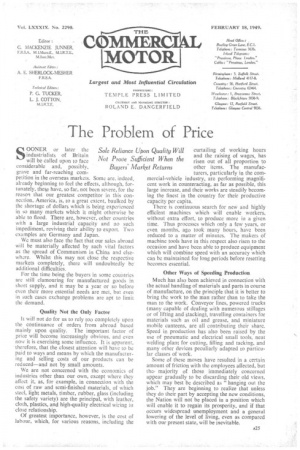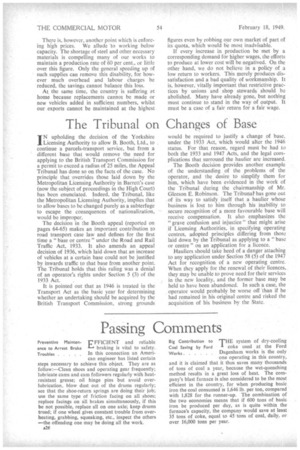The Problem of Price
Page 1

Page 2

If you've noticed an error in this article please click here to report it so we can fix it.
SOONER or later the industrialists of Britain will be called upon to face considerable and, possibly, grave and far-reaching competition in the overseas markets. Some are, indeed, already beginning to feel the effects, although, fortunately, these have, so far, not been severe, for the reason that our greatest competitor in this connection. America, is, to a great extent, baulked by the shortage of dollars which is being experienced in so many markets which it might otherwise be able to flood. There are, however, other countries with a large industrial capacity and no such impediment, reviving their ability to export. Two examples are Germany and Japan.
We must also face the fact that our sales abroad will be materially affected by such vital factors as the spread of Communism in China and elsewhere. Whilst this may not close the respective markets completely, there will undoubtedly be additional difficulties.
For the time being the buyers in some countries are still clamouring for manufactured goods in short supply, and it may be a year or so before even their more essential needs are met, but even in such cases exchange problems are apt to limit the demand.
Quality Not the Only Factor It will not do for us to rely too completely upon the continuance of orders from abroad based mainly upon quality. The important factor of .price will become increasingly obvious, and even now it is exercising some influence. It is apparent, therefore, that the closest attention will have to be paid to ways and means by which the manufacturing and selling costs of our products can be reduced—and not by small amounts.
We are not concerned with the economics of industries other than our own, except where they affect it, as, for example, in connection with the cost of raw and semi-finished materials, of which steel, light metals, timber, rubber, glass (including the safety variety) are the principal, with leather, cloth, plastics, and high-quality electrical wiring in • close relationship. Of greatest importance, however, is the cost or labour, which, for various reasons, including the curtailing of working hours and the raising of wages, has risen out of all proportion to other items. The manufacturers, particularly in the commercial-vehicle industry, are performing magnificent work in counteracting, as far as possible, this large increase, and their works are steadily becoming the finest in the country for their productive capacity per capita.
There is continuous search for new and highly efficient machines which will enable workers, without extra effort,. to produce more in a given time. Thus processes which only a few years, or even months, ago took many hours, have been reduced to a matter of minutes. The makers of machine tools have in this respect also risen to the occasion and have been able to produce equipment which will combine speed with an accuracy which can be maintained for long periods before resetting becomes essential.
Other Ways of Speeding Production Much has also been achieved in connection with the actual handling of materials and parts in course of manufacture, on the principle that it is better to bring the work to the man rather than to take the man to the work. Conveyor lines, powered trucks (many capable of dealing with numerous stillages or of lifting and stacking), travelling containers for materials such as oil and grease, and miniature mobile canteens, are all contributing their share. Speed in production has also been raised by the use of pneumatic and electrical small tools, neat welding plant for cutting, filling and tacking, and many other devices peculiarly adapted to particular classes of work.
Some of these moves have resulted in a certain amount of friction with the employees affected, but themajority of those immediately concerned appear gradually to be discarding their old views, which may best be described as "hanging out the job." They are beginning to realize that unless they do their part by accepting the new conditions, the Nation will not be placed in a position which will enable it to regain its prosperity, and if that occurs widespread unemployment and a general lowering of the level of living, even as compared with our present state, will be inevitable. There is, however, another point which is enforcing high prices. We allude 'to working below capacity. The shortage of steel and other necessary materials is compelling many of our works to maintain a production rate of 60 per cent., or little over this figure. Only the general speeding up of such supplies can remove this disability, for however much overhead and labour charges be reduced, the savings cannot balance this loss.
At the same time, the country is suffering a t home because replacements cannot be made or new vehicles added in sufficient numbers, whilst our exports cannot be maintained at the highest figures even by robbing our own market of part of its quota, which would be most inadvisable.
If every increase in production be met by a corresponding demand for higher wages, the efforts to produce at lower cost will be negatived. On the other hand, we do not believe in a policy of a low return to workers. This merely produces dissatisfaction and a bad quality of workmanship. It is, however, vitally important that restrictive practices by unions and shop stewards should be abolished. Many have already gone, but nothing must continue to stand in the way of output. It must be a case of a fair return for a fair wage.


























